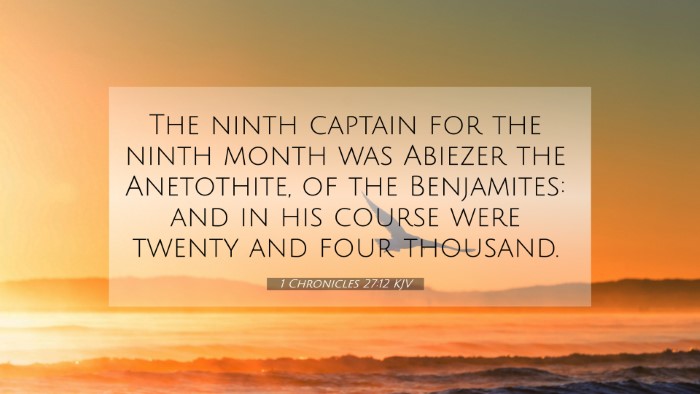Understanding 1 Chronicles 27:12
Verse: 1 Chronicles 27:12 states, "The twelfth captain for the twelfth month was Heldai the Netophathite, of the Netophathites: and in his course were twenty and four thousand." This verse is part of a section detailing the military captains and their service months under King David's reign.
Verses and Themes Explored
This verse provides information about the organization and administration of David's army, indicating an orderly approach to military leadership and service.
Key Insights from Commentaries
-
Matthew Henry:
Henry notes that the listing of captains signifies the importance of military organization under David's rule. He highlights the importance of every individual in their respective roles, emphasizing that the strength of the army lies in its structure.
-
Albert Barnes:
Barnes emphasizes the significance of geographical representation, calling attention to the Netophathites' role. He compares it with previous verses to illustrate the spiritual and physical preparedness required in leadership.
-
Adam Clarke:
Clarke elaborates on the cultural context of the captains, exploring how the structure reflects the values of the Israelite community. His analysis connects this military organization to the broader theme of divine order and governance intended by God.
Cross-References and Related Verses
Here, we explore several Bible verses that relate to 1 Chronicles 27:12:
- 1 Chronicles 12:27-29: Discusses the numbers and appointments of other captains, highlighting the importance of military order.
- 2 Samuel 23:8-39: Lists David's mighty men, providing context about David's military leaders and their valor.
- Numbers 10:14-16: Illustrates the tribal leaders and their roles during Israel's journey, paralleling David's military organization.
- 1 Chronicles 21:5: Gives a census count that ties into the leadership structure that David had set in place.
- 1 Chronicles 13:1: Details David's intention to bring the Ark to Jerusalem with careful planning, indicative of his overall leadership strategy.
- 1 Chronicles 25:1: Discusses the appointment of musicians, reflecting the multifaceted organization of David’s reign.
- Hebrews 13:7: Encourages remembrance of leaders and their way of life, connecting modern understanding of leadership to biblical examples.
- 1 Timothy 3:1: Offers insight into the qualifications for leadership, relevant for understanding the qualities valued in military captains.
- Acts 6:3: Discusses the selection of leaders among the disciples, echoing the importance of structured leadership.
- Romans 12:4-8: Talks about the members in the body of Christ serving different roles, akin to the roles of David's captains.
Thematic Connections
In analyzing 1 Chronicles 27:12, we observe recurring themes such as:
- Leadership: The verse exemplifies the qualities of effective leadership based on service and organization.
- Service Structure: It underlines the significance of each role in a collective goal, mirroring principles applicable in contemporary contexts.
- Divine Order: The organization reflects God's design for governance within His people, highlighting themes of obedience and structure.
- Military Preparedness: Demonstrates a commitment to readiness and strategic planning, essential for both ancient and modern leadership.
How to Study This Verse
For those examining this verse, consider the following methods:
- Comparative Bible Verse Analysis: Look at other passages that discuss leadership and military organization for deeper understanding.
- Bible Cross-Reference Guide: Utilize tools to find cross-references that enhance comprehension of the themes involved.
- Contextual Study: Explore the historical and cultural background of David's reign to grasp the broader implications of military governance.
- Thematic Connections: Identify how this verse connects with both Old and New Testament teachings concerning leadership and service.
Final Thoughts
The value of 1 Chronicles 27:12 extends beyond its immediate context, offering timeless principles for leadership and organized service. By exploring its connections through cross-referencing various passages, readers gain profound insights into the biblical approach to governance, community, and shared purpose under divine guidance.
Engaging with this verse through the lens of scriptural cross-referencing, thematic links, and understanding the role of leaders in both historical and spiritual contexts can enrich one’s study of the Bible. These practices encourage an active dialogue with Scripture, fostering deeper insight and understanding of biblical truths.




